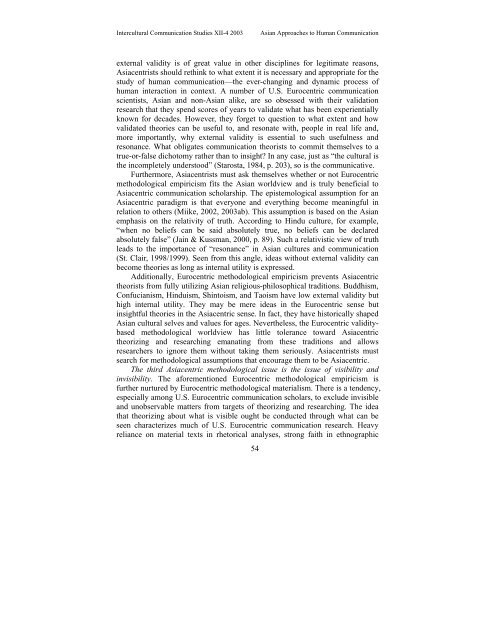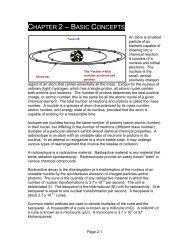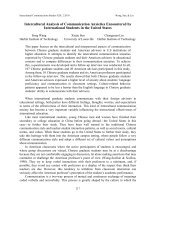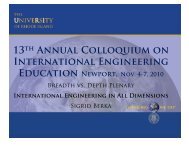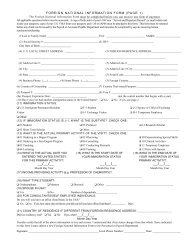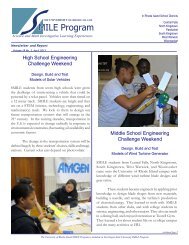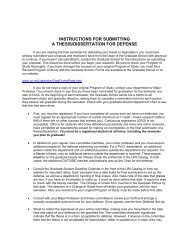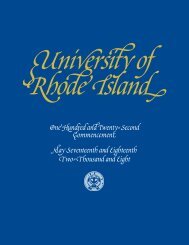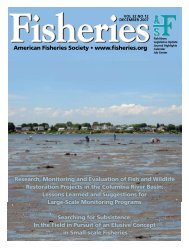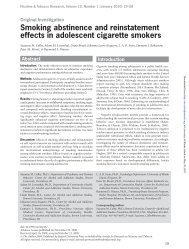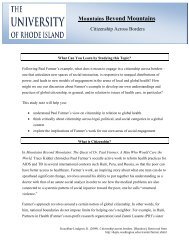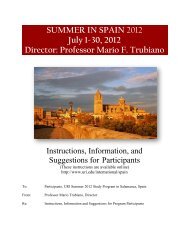asian approaches to human communication - University of Rhode ...
asian approaches to human communication - University of Rhode ...
asian approaches to human communication - University of Rhode ...
You also want an ePaper? Increase the reach of your titles
YUMPU automatically turns print PDFs into web optimized ePapers that Google loves.
Intercultural Communication Studies XII-4 2003 Asian Approaches <strong>to</strong> Human Communication<br />
external validity is <strong>of</strong> great value in other disciplines for legitimate reasons,<br />
Asiacentrists should rethink <strong>to</strong> what extent it is necessary and appropriate for the<br />
study <strong>of</strong> <strong>human</strong> <strong>communication</strong>—the ever-changing and dynamic process <strong>of</strong><br />
<strong>human</strong> interaction in context. A number <strong>of</strong> U.S. Eurocentric <strong>communication</strong><br />
scientists, Asian and non-Asian alike, are so obsessed with their validation<br />
research that they spend scores <strong>of</strong> years <strong>to</strong> validate what has been experientially<br />
known for decades. However, they forget <strong>to</strong> question <strong>to</strong> what extent and how<br />
validated theories can be useful <strong>to</strong>, and resonate with, people in real life and,<br />
more importantly, why external validity is essential <strong>to</strong> such usefulness and<br />
resonance. What obligates <strong>communication</strong> theorists <strong>to</strong> commit themselves <strong>to</strong> a<br />
true-or-false dicho<strong>to</strong>my rather than <strong>to</strong> insight? In any case, just as “the cultural is<br />
the incompletely unders<strong>to</strong>od” (Starosta, 1984, p. 203), so is the communicative.<br />
Furthermore, Asiacentrists must ask themselves whether or not Eurocentric<br />
methodological empiricism fits the Asian worldview and is truly beneficial <strong>to</strong><br />
Asiacentric <strong>communication</strong> scholarship. The epistemological assumption for an<br />
Asiacentric paradigm is that everyone and everything become meaningful in<br />
relation <strong>to</strong> others (Miike, 2002, 2003ab). This assumption is based on the Asian<br />
emphasis on the relativity <strong>of</strong> truth. According <strong>to</strong> Hindu culture, for example,<br />
“when no beliefs can be said absolutely true, no beliefs can be declared<br />
absolutely false” (Jain & Kussman, 2000, p. 89). Such a relativistic view <strong>of</strong> truth<br />
leads <strong>to</strong> the importance <strong>of</strong> “resonance” in Asian cultures and <strong>communication</strong><br />
(St. Clair, 1998/1999). Seen from this angle, ideas without external validity can<br />
become theories as long as internal utility is expressed.<br />
Additionally, Eurocentric methodological empiricism prevents Asiacentric<br />
theorists from fully utilizing Asian religious-philosophical traditions. Buddhism,<br />
Confucianism, Hinduism, Shin<strong>to</strong>ism, and Taoism have low external validity but<br />
high internal utility. They may be mere ideas in the Eurocentric sense but<br />
insightful theories in the Asiacentric sense. In fact, they have his<strong>to</strong>rically shaped<br />
Asian cultural selves and values for ages. Nevertheless, the Eurocentric validitybased<br />
methodological worldview has little <strong>to</strong>lerance <strong>to</strong>ward Asiacentric<br />
theorizing and researching emanating from these traditions and allows<br />
researchers <strong>to</strong> ignore them without taking them seriously. Asiacentrists must<br />
search for methodological assumptions that encourage them <strong>to</strong> be Asiacentric.<br />
The third Asiacentric methodological issue is the issue <strong>of</strong> visibility and<br />
invisibility. The aforementioned Eurocentric methodological empiricism is<br />
further nurtured by Eurocentric methodological materialism. There is a tendency,<br />
especially among U.S. Eurocentric <strong>communication</strong> scholars, <strong>to</strong> exclude invisible<br />
and unobservable matters from targets <strong>of</strong> theorizing and researching. The idea<br />
that theorizing about what is visible ought be conducted through what can be<br />
seen characterizes much <strong>of</strong> U.S. Eurocentric <strong>communication</strong> research. Heavy<br />
reliance on material texts in rhe<strong>to</strong>rical analyses, strong faith in ethnographic<br />
54


